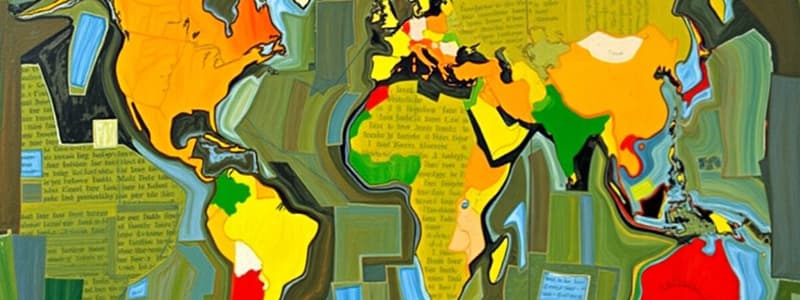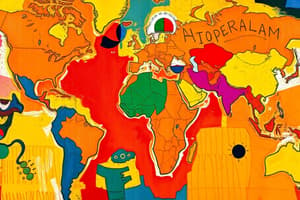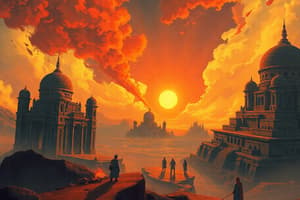Podcast
Questions and Answers
What does the term 'eurocentrism' primarily refer to in the context of colonial history?
What does the term 'eurocentrism' primarily refer to in the context of colonial history?
- The idea that all cultures are equally significant without bias.
- The perspective that emphasizes European culture and history as central to global development. (correct)
- The belief in the superiority of Eastern cultures over Western cultures.
- A focus on non-European civilizations and their contributions.
Which form of imperialism is primarily characterized by direct control over a territory and its governance?
Which form of imperialism is primarily characterized by direct control over a territory and its governance?
- Cultural imperialism
- Neocolonialism
- Economic imperialism
- Colonial imperialism (correct)
How does ethno-imperialism differ from traditional imperialism?
How does ethno-imperialism differ from traditional imperialism?
- Traditional imperialism does not involve any cultural aspects.
- Ethno-imperialism is concerned with cultural superiority and racial hierarchies. (correct)
- Ethno-imperialism includes the invasion of multiple territories.
- Ethno-imperialism focuses exclusively on economic dominance.
What potential legacy of historical globalization might contemporary society face?
What potential legacy of historical globalization might contemporary society face?
Which of the following best describes the concept of 'modernism' in relation to historical globalization?
Which of the following best describes the concept of 'modernism' in relation to historical globalization?
Which type of imperialism focuses on direct control over the local government and administration?
Which type of imperialism focuses on direct control over the local government and administration?
What is a common characteristic of economic imperialism?
What is a common characteristic of economic imperialism?
How does Eurocentrism manifest in the context of history?
How does Eurocentrism manifest in the context of history?
In what way did colonialism impact the nations subjected to imperialism?
In what way did colonialism impact the nations subjected to imperialism?
Which example best illustrates cultural imperialism?
Which example best illustrates cultural imperialism?
What is a common misconception about the effects of imperialism?
What is a common misconception about the effects of imperialism?
Which type of imperialism often relies on indirect control through local elites?
Which type of imperialism often relies on indirect control through local elites?
What is a key challenge for those analyzing the impact of imperialism in history?
What is a key challenge for those analyzing the impact of imperialism in history?
Which event led to the main change in the division of Canada between two countries?
Which event led to the main change in the division of Canada between two countries?
How did Canada becoming a British colony primarily affect French settlers?
How did Canada becoming a British colony primarily affect French settlers?
What was the primary goal of the Proclamation of 1763?
What was the primary goal of the Proclamation of 1763?
Which group was primarily impacted by the creation of the CPR (Canadian Pacific Railway)?
Which group was primarily impacted by the creation of the CPR (Canadian Pacific Railway)?
Which of the following best describes the initial relationship between Europeans and Indigenous peoples in Canada?
Which of the following best describes the initial relationship between Europeans and Indigenous peoples in Canada?
What purpose did the Numbered Treaties serve during European settlement in Canada?
What purpose did the Numbered Treaties serve during European settlement in Canada?
During which historical period did France begin permanent colonies in Canada?
During which historical period did France begin permanent colonies in Canada?
Which statement best captures a consequence of European settlement in Canada?
Which statement best captures a consequence of European settlement in Canada?
Flashcards
Historical Globalization
Historical Globalization
The global interconnectedness and exchange of ideas, goods, and people that occurred in the past.
Eurocentrism
Eurocentrism
A way of viewing the world that emphasizes European history, culture, and values as central and superior.
Imperialism
Imperialism
The policy of extending a country's power and influence through diplomacy or military force.
Ethnocentrism
Ethnocentrism
Signup and view all the flashcards
Contemporary Society's Response
Contemporary Society's Response
Signup and view all the flashcards
Types of Imperialism in India
Types of Imperialism in India
Signup and view all the flashcards
Positive Side of Imperialism
Positive Side of Imperialism
Signup and view all the flashcards
Flipped Classroom Example
Flipped Classroom Example
Signup and view all the flashcards
Positional Papers
Positional Papers
Signup and view all the flashcards
Strong Position Papers
Strong Position Papers
Signup and view all the flashcards
Case Evidence in Essays
Case Evidence in Essays
Signup and view all the flashcards
Evidence Linking to Globalization
Evidence Linking to Globalization
Signup and view all the flashcards
Social Terminology in Essays
Social Terminology in Essays
Signup and view all the flashcards
Canada's division
Canada's division
Signup and view all the flashcards
British Colony Impact on French Settlers
British Colony Impact on French Settlers
Signup and view all the flashcards
Proclamation of 1763
Proclamation of 1763
Signup and view all the flashcards
Quebec Act
Quebec Act
Signup and view all the flashcards
CPR Purpose
CPR Purpose
Signup and view all the flashcards
CPR Impact
CPR Impact
Signup and view all the flashcards
Early Canadian Relationships
Early Canadian Relationships
Signup and view all the flashcards
Competition and Settlement
Competition and Settlement
Signup and view all the flashcards
Study Notes
Questions for Study
- To what extent should contemporary society respond to the legacies of historical globalization?
- What is the relationship between imperialism, ethnocentrism, and eurocentrism?
- What is paternalism?
- Relate "The White Man's Burden" to ethno/eurocentrism, paternalism, and imperialism
- What is the British Raj?
- What types of imperialism do we see in India? Provide one example for each
- Why is India sometimes used as a case study showing a positive side of imperialism?
- Positional Papers:
- Overall, very well done; restate the quote in your own words, be descriptive.
- Argument
- Provide case evidence and explain the evidence.
- It is not a history paper. Strong papers had about 2 points of evidence that were directly linked to globalization and explained.
- Use social terminology.
- Strong papers restated their topic sentence/thesis statement within their paragraph.
- Highlight your argument, case evidence, and explanation.
- British and French Rule in Canada:
- Historically, how was Canada divided (between countries/where)? Why did this change? (War/battle/treaty)
- How did Canada becoming a British colony affect French settlers? Why? (Look for buzz words)
- What was the goal and outcome of the Proclamation of 1763 and the Quebec Act?
- Why was the CPR created? Who did this impact (multiple groups!)? Why?
- Changing Relationships Over Time:
- When Europeans first arrived in Canada, they needed to cooperate with the Indigenous peoples in order to survive and trade.
- Fur Trade - Needed Indigenous peoples as a guide.
- How to get food?
- Medicine - Pine trees to treat scurvy.
- When it became time for the Europeans to settle, they began to compete with the Indigenous peoples.
- Limited Resources
- Who gets to live on the land? Who has access to the food and water?
- Finally, once the Europeans were settled and powerful, they coerced the First Nations people to sign treaties.
- Numbered Treaties
- Indian Act
- Imperialism at Home:
- France was the first European country to begin permanent colonies in Canada during the age of historical globalization.
- Due to their focus on the fur trade, relationships with the First Nations in the East were generally cooperative.
- French settlers began to establish their own identities and became the Acadians and Canadiens of New France.
- Connect to the present: where do you see the identities of French settlers reflected in Canada today?
- The British were also very interested in the fur trade in Canada, though they began to colonize Canada after the French and focused on the Hudson’s Bay area.
- The Seven Years War:
- Competition over the fur trade and claiming land eventually led to war between the French and British in Canada.
- The war ended with the Treaty of Paris, which made New France into a British colony.
- Proclamation of 1763:
- Created by the British government in Canada and took away the rights of Canadiens.
- Voting rights
- Land rights
- The hope, was that Canadiens would give up their French identity in order to regain these rights.
- Quebec Act of 1774:
- When the American colonies started the War of Independence, Britain did not want to risk the Canadiens fighting for the Americans.
- Guaranteed rights
- Language
- Religion
- Civil law (legal rights)
- Durham Report -1839:
- "The Canadiens are ignorant and uncultured."
- The Canadian Pacific Railway (CPR):
- After becoming a country in 1867, Canada sought to expand its borders West.
- As more immigrants migrated to Canada, this expansion became necessary.
- This railway also was seen as a contribution to British military and naval strength.
- Indigenous Land:
- Long before the arrival of Europeans, Turtle Island (North America) was home to millions of First Nations Peoples who lived in thousands of distinct societies.
- Numbered Treaties:
- Map of the Numbered Treaties which affect Alberta
- Treaty Making:
- Nation: a large body of people united by common descent, history, culture, or language, inhabiting a particular country or territory.
- Sovereignty: the authority of a state to govern itself or another state.
- First Nations: sacred agreements between two nations.
- British: actually acknowledged the First Nations were nations equal to them.
- However, this was not how Europeans acted.
- Translators sometimes struggled to convey meanings not shared between cultures.
- The Indian Act:
- Defined who was considered "Indian."
- Set out laws about how Natives and reserves were to be "dealt with."
- Appointed Indian Agents to take charge of individual reserves and band councils.
- Traditional governments were replaced by band councils who had little power.
- An Aboriginal woman who married a non-Aboriginal man was no longer classified as an Aboriginal.
- Inhabitants of reserves could not own their own houses or land.
- Denied women status
- Introduced residential schools
- Created reserves
- Renamed individuals with European names
- Restricted First Nations from leaving reserve without permission from an Indian Agent
- Prohibited sale of ammunition to First Nations
- Forbade First Nations from forming political organizations
- Forbade First Nations from speaking their native language
- Forbade First Nations from practicing their traditional religion
- Forbade western First Nations from appearing in any public dance, show, exhibition, stampede or pageant wearing traditional regalia
- Reserves
- The Indian Act required all First Nation People to live on reserves established by the government.
- By moving First Nation Peoples away from white society, what was the government of Canada trying to accomplish?
- Additional Questions:
- What were implications of The Indian Act towards the Indigenous Peoples?
- What is the Proclamation of 1763?
- How did the Quebec Act of 1774 come to be?
Studying That Suits You
Use AI to generate personalized quizzes and flashcards to suit your learning preferences.




